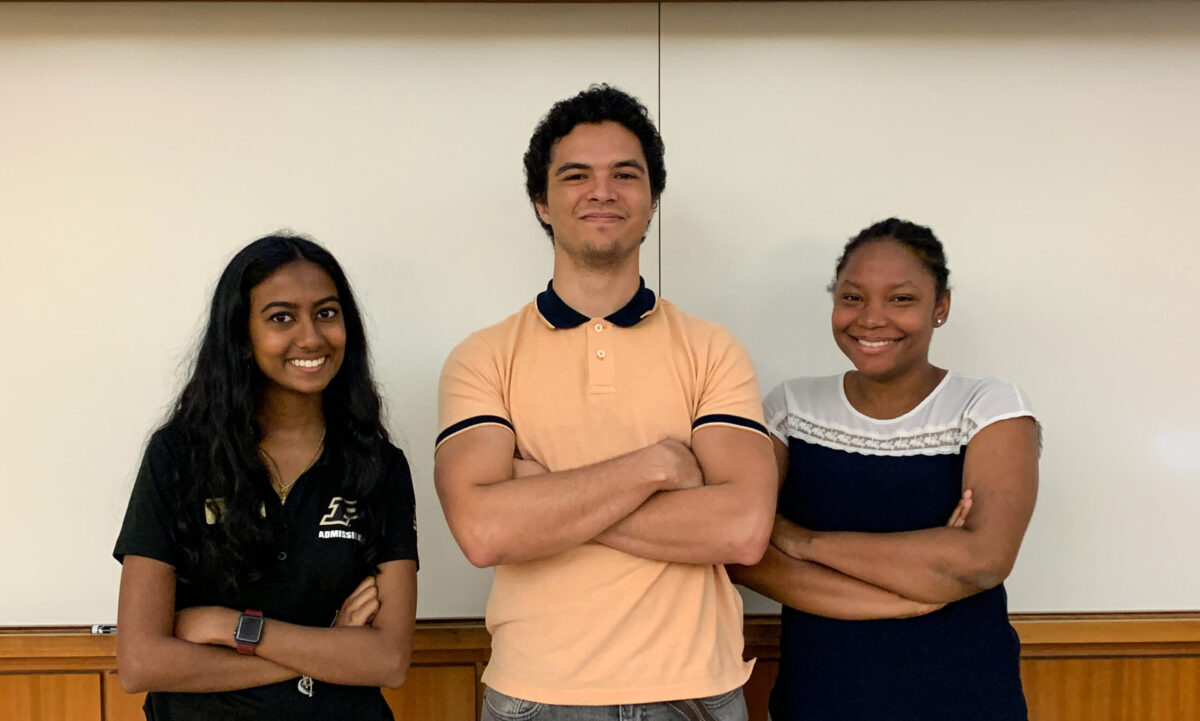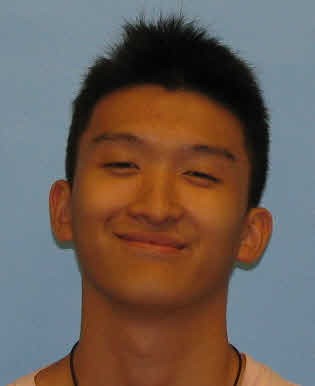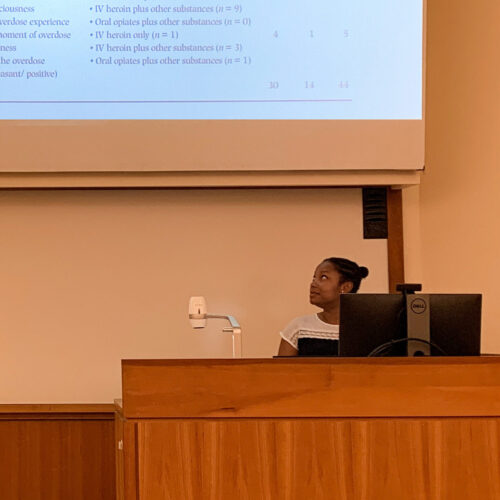HHS students prepare for graduate school through LSAMP research opportunities, mentorship and more
Written By: Rebecca Hoffa, rhoffa@purdue.edu

LSAMP students (from left to right) Ramya Anbarasu, Asher Denny and Christelle Altidor pose for a photo after their Journal Club research presentations on June 28 in RAWL 1062.Rebecca Hoffa
The prospect of graduate school can seem daunting for any undergraduate student, but for students from underrepresented backgrounds, the stakes can be even higher. To help these students gain momentum toward graduate school in STEM fields and get involved in research, the Purdue University Louis Strokes Alliance for Minority Participation (LSAMP) program supports a variety of research and professional development opportunities during the fall, spring and summer semesters. The program also offers funding to support students’ research activities.
This summer, 11 students from the College of Health and Human Sciences (HHS) are among the 19 Purdue students participating in the program, which will culminate in research poster presentations from 1-3 p.m. July 27 in Stewart Center, Room 306.
“With research in any field, it’s going to be really competitive and really scary to get into, and then when you have less resources, that almost completely cuts you out, so I would say LSAMP at Purdue is really, really important,” said Ramya Anbarasu, an HHS senior studying brain and behavioral sciences. “It helps so many people take that first step into the research world and into what their career interest could be.”
Tackling tough challenges
For 2022 graduate Asher Denny, who is taking a gap year to prepare for graduate school, the LSAMP program offers an opportunity to advance the research he began as an undergraduate without the additional financial burden of supporting his research.
“When you’re doing this sort of research, it’s really hard to try to balance that with an actual regular job, so being able to support myself while I’m doing the work I’m doing is really wonderful because otherwise I would slow down this process a lot more,” Denny said. “Especially since I’ve graduated now, I’ve been able to get a lot more progress done on my project than I had been during earlier semesters.”
Having majored in psychological sciences as an undergraduate, Denny is conducting his research in Assistant Professor Melissa Robertson’s Relationships and Work Lab in the Department of Psychological Sciences, which investigates ways to improve relationships in the workplace. Denny’s research project focuses on cultural awareness, or the knowledge and acceptance of other cultures and cultural identities, with the goal of creating a model that can be applied within the industrial-organizational psychology field. Denny noted Robertson’s mentorship has been valuable as he begins to look toward graduate school.
“It’s been a really good process,” Denny said. “She’s really helped me through working toward doing higher level stuff. It’s always really wonderful to have that sort of mentorship.”

Zhen YapPhoto provided
Like Denny, Zhen Yap, who is entering his fourth year at Purdue, values the dedicated research time the LSAMP program allows him. A health and kinesiology major, Yap works under the mentorship of Daniel Hirai, assistant professor of in the Department of Health and Kinesiology, to investigate how heat therapy may improve cardiovascular and skeletal muscle function.
Planning to attend physical therapy school upon graduation, Yap values the real-world applications his research project will have in his future career. Although Yap had been involved in Hirai’s lab prior to the program, he noted that being engaged in research over the summer has allowed him to have significantly more responsibility in the lab.
“During the school year, I did research, but it was mostly an hour a couple times a day that I would maybe go and observe — I didn’t really do that much hands-on work,” Yap explained. “But then this summer, I’ve really been more involved. It’s just me and this one other PhD student, Michael Belbis — we’re a pretty small lab, so I actually get to have quite a lot of responsibility. I’m making graphs. I’m looking at the data. I’m absorbing more information than I can handle sometimes, but it’s good to learn. I’m learning all kinds of statistical analyses. I’m getting to go through the whole process of research.”
Making connections
Fourth-year nursing student Christelle Altidor discovered the LSAMP program through a psychology course she was taking. Having switched from engineering to nursing her sophomore year to pursue a major that offered more human connection, she thought the research experience would help as she pursued graduate school to earn her PhD in nursing.
“I felt like doing research this summer and not having to take classes would be a way to experience what being a professor here doing research at Purdue could be like,” Altidor said. “With the mentoring that they offer for students pursuing grad school, I felt like it was a good fit.”

Christelle Altidor presents her research article at the June 28 Journal Club meeting. Rebecca Hoffa
Altidor did not have previous research experience, so she was connected through the LSAMP program with Nicole Adams, a clinical assistant professor in the School of Nursing, whose research works to address the opioid crisis through collaborations with engineers to develop innovative tools for community use.
In addition to her new mentorship connection with Adams, Altidor said she appreciates the other networking opportunities LSAMP provides with people who can be important resources for graduate school, such as LSAMP alumni. She noted that her favorite part of the program has been the connections she has made with other students, especially through the program’s weekly Journal Club meetings, where students present a published study related to their research interests.
“It is nice to work with other minority students over the summer because it’s not really intimidating,” Altidor said. “Although we’re not all from the same background, we face a lot of the same struggles.”
The connections made this summer are also important to senior Ramya Anbarasu. Working under the mentorship of David Rollock, 150th Anniversary Professor of Psychological Sciences, and his graduate students, Adilene Osnaya and Shabeba Islam, Anbarasu is spending her summer researching acculturation across two groups: South Asian immigrants and Latinx immigrants. In the future, she hopes to pursue her PhD with a focus on clinical psychology.
Beyond her research, Anbarasu said she’s enjoyed connecting with LSAMP program advisor Ignacio Camarillo, associate professor of biological sciences, because he makes the program activities engaging while also being able to relate to many of the program participants’ experiences as underrepresented students.
“Dr. Camarillo is a lot of fun,” Anbarasu said. “I really like going to our Journal Club meetings and any other meetings that we have because he is just such a fun person to listen to with such a bright personality.”
Anbarasu also values the weekly Journal Club presentations’ opportunities to engage with people who have majors across campus and learn about research she’s never heard of before.
“I think it’s really cool because obviously I’ve only done psychology stuff, and everybody around me is in psychology, but the LSAMP program looks at everybody’s major, so there’s some people in biology, there’s some people in engineering, and you get to see a little mix of everything,” Anbarasu said.
From the research opportunities to the new connections made, Anbarasu noted that there’s a lot she will take away from the LSAMP program as she heads into her future.
“It is really hard as a minority to get into certain opportunities, and it’s really nice that LSAMP is this specific program that helps you get that foot forward,” Anbarasu said. “It will definitely help in the future because we’ll have something under our belt, such as a summer research program that we were able to get into and that we were really able to hone our interests.”